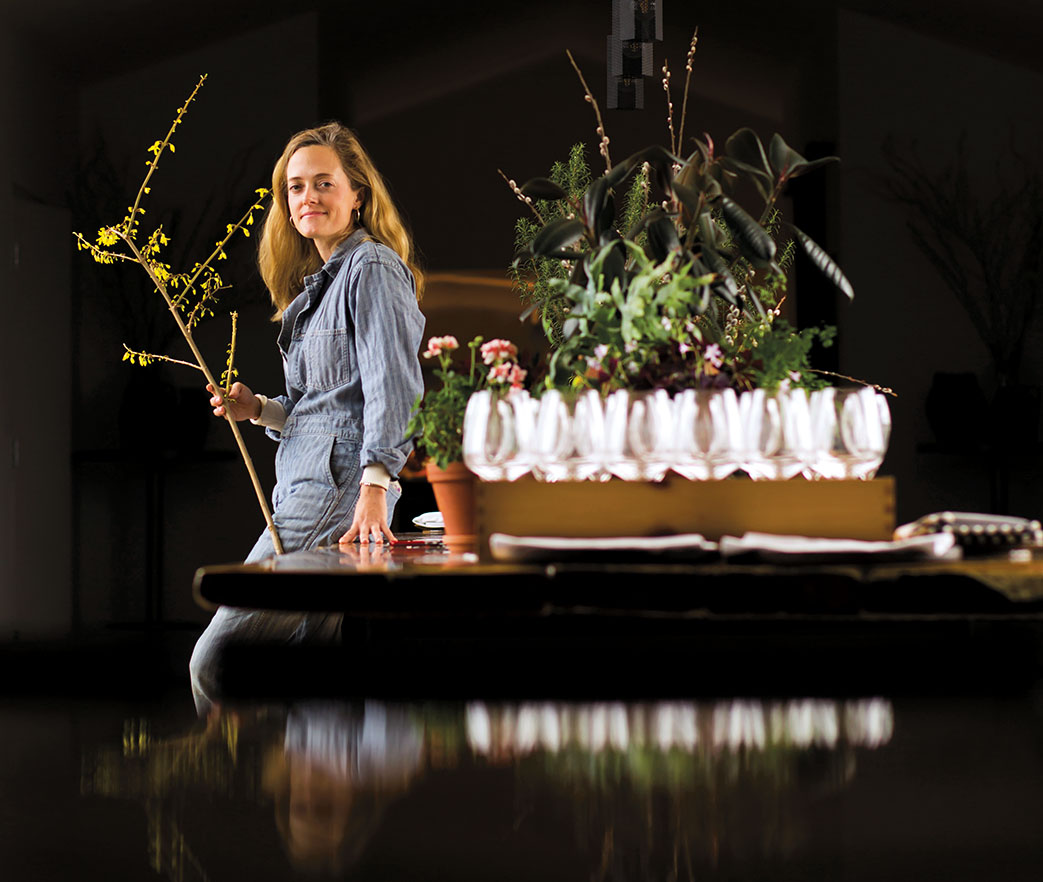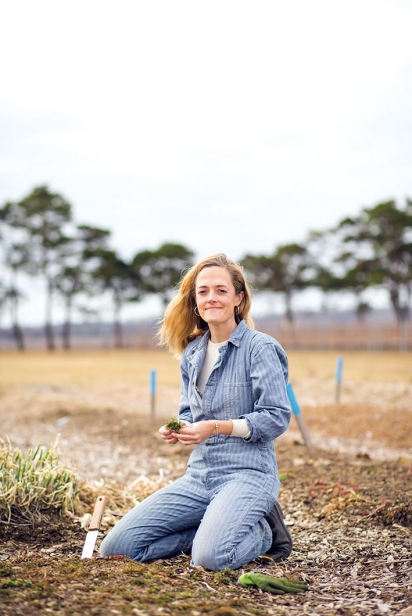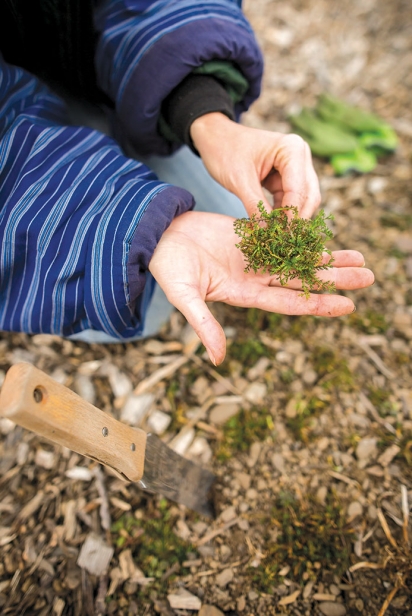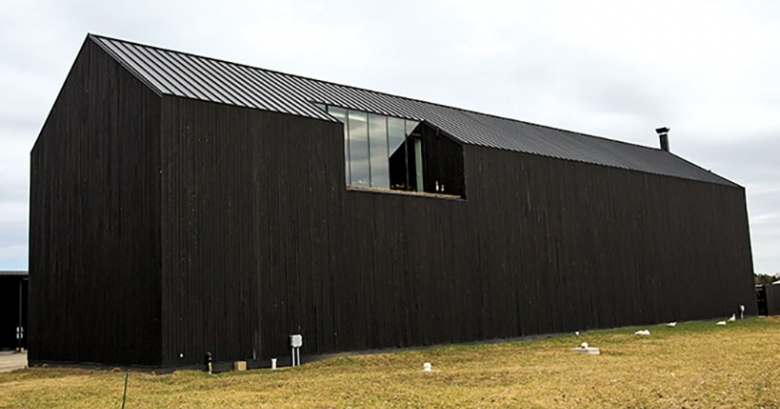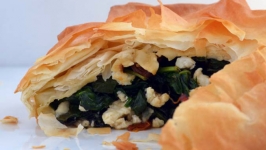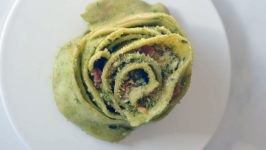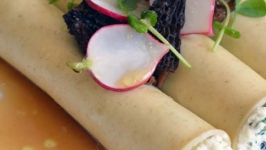The Wonderful Wizard of Plants
The snow has barely melted, but Deirdre Fraser can't stop thinking about plants. Green plants. Spring plants. "I get really excited in the spring when things first come back, it's like the whole world coming alive again," says Fraser, the plant wizard who is dedicated to The Restaurant at Pearl Morissette winery.
Yes, "plant wizard" is her official title. "The more descriptive version would be forager-slash-gardener," Fraser explains. "Plant Wizard is just a playful way of saying that I fulfil many roles regarding plants here."
Not every restaurant has a plant wizard, but The Restaurant at Pearl Morissette has been pushing the envelope since opening November 2017. Here, in a renovated black barn steps from the Pearl Morissette winery in the quiet Niagara town of Jordan Station, co-chefs Daniel Hadida and Eric Robertson serve French-inspired modern tasting menus unlike anything else in the region. Like the winery, the restaurant has garnered considerable acclaim, including a nod from Air Canada enRoute as the country's best new restaurant of 2018.
Hadida and Robertson's food revolves around pristine ingredients — especially highlighting great produce from the bounty of Niagara. That's where Fraser comes in. The restaurant purchases from many local farmers, but Fraser supplies the special touches — foraged mushrooms, wild garlic shoots, rare herbs grown just outside the restaurant's doors and even the wildflowers that decorate the dining room. "Probably every dish we serve here has Deirdre's touch on it," Hadida says.
In some sense, it's no surprise that Fraser's products dot every dish at the restaurant since she used to spread her wizardry across at least 10 establishments in the GTA before joining the opening team at Pearl Morissette.
Using everything Fraser brings to the kitchen can be a challenge, but it's one the chefs relish. "Deirdre comes in at five o'clock on a Friday and drops a big bin of something on the pass and in the moment it stresses you out, but by the end of the week you need more," Roberston says. Some of the products get used fresh, but many are preserved for a later date. Pickles, oils and powders that flavour many of the restaurant's dishes all start with Fraser.
Seven years ago, following the huge success of Copenhagen's famed restaurant Noma and amidst a boom of chef-owned restaurants in Toronto's west end, Fraser noticed that chefs were suddenly as interested in wild edibles as she was. "Toronto chefs needed to have that same sort of representation of authenticity on their plates," she says.
Fraser had been working in Toronto kitchens at the time, but decided to take the summer off to sell food she foraged in Niagara, where she grew up. "Suddenly everyone was interested and they were backing it up with cash money in their hands, so that seemed like the way forward," she recalls.
Once a week, Fraser packed eight large Styrofoam coolers into the luggage compartment of a Megabus bound for Toronto. Once there, she unloaded her wares into a bike trailer and began her tour of Toronto's west side delivering to places such as Edulis, Woodlot and Dandylion.
"I only had one day to deliver and chefs aren't at the restaurant before 11 a.m. and by 4:30 p.m. they're really cranky, so you only have so many hours to hit 10 restaurants," she says. "But it worked out."
Word travelled quickly from one chef to another and Fraser's little business took off. Over the years, she expanded to include herbs from her home garden and even eventually made her life easier by getting a car. But her pattern of working in kitchens during the winter then quitting each spring seemed unsustainable after six years.
Fraser grew up in Port Colborne, on Lake Erie's north shore, but never thought she'd end up staying in Niagara as an adult.
"It's weird to be in the small town I grew up in," she says. "In middle school and high school, I was desperate to get away, but it's all kind of come back now. It seems natural."
Her parents were artists who always had a garden at the family home. As a child, she devoured a copy of Euell Gibbons' classic foraging guide and wild food cookbook, Stalking the Wild Asparagus, and, in her free time, would wander the woods looking for exciting things to eat.
She had effectively been waiting her whole life for this moment when wild food became mainstream. "It was weird to suddenly see that in the zeitgeist because it was the kind of thing I would have been made fun of for as a kid," she says, laughing.
When Hadida approached her to come work at Pearl Morissette full-time, Fraser was finally ready to plant roots back in Niagara. The growing season in Ontario is relatively short and Fraser never had interest in becoming a distributor bringing in goods from other regions, so she jumped at this unexpected opportunity.
"This is the first time someone's followed through and said ‘we value what you're doing, and we get that it's weird, but we believe in that and we're going to support you,'" Fraser says. "It's a yearround job and they're giving me time in the winter to sit and do research and really plan."
And while spring through fall is undoubtedly Fraser's busy season — "as soon as it's warm I'll be just absolutely slammed and no one will see me until it's November" — she's doesn't let winter freeze her progress.
When I visit in early March, Fraser is consumed with research into gardening techniques, floral varieties, seed saving and seed breeding. She's also busy mapping out timelines for products to help the chefs prepare, planning for a garden expansion and thinking about maximizing her makeshift unheated greenhouse space to jumpstart the early crops.
Fraser's garden isn't certified organic, but it's no surprise she adheres to organic principles. "Obviously, we're never going to spray," she says, but she's open to experimenting with other natural methods. "There's so much going on in gardening. Suddenly people can be connected and share ideas and information in a much faster and more accessible way."
She likes to draw from biodynamic and permaculture aspects, for example, yet isn't a fervent devotee to any one method — flavour over dogma.
But the quest for the best tasting product starts at the seed.
"I'm looking at seed catalogues from all over the place, just trying to dig out anything that's lost or forgotten, or odd," Fraser says.
She's not only looking at heirloom seeds, but also at newly developed seeds bred for flavour and hardiness. "It's a really interesting part of science," she says. "The heirloom movement has been very good and people should be growing and saving seeds, but going into the future those vegetables need to adapt to climate and hardiness, to changing conditions and insect and disease pressure, so now a lot of breeders are working on that — trying to cross heirloom vegetables with tougher, more adaptable varieties."
Fraser's pursuit for the best seeds and wild edibles is all part of her goal to push the limits of her home region and prove how special the land is here. Food, she says, is "one of the few platforms that we have to get people to pay attention to the fact that the land is worth more than just development. We want to see what the potential of the area is and see how we can make it integral — have it make sense."
Everything she does is with the future in mind, not just for this season, but five or ten years down the road.
The property at Pearl Morissette is already stunning in the summer — peaches hang from trees in the small orchard, the gardens burst with bright green herbs and tiny red berries, grapes ripen slowly in the vineyards, wildflowers dot the landscape, but Fraser and everyone else on staff here, chefs, servers, winemakers and vineyard managers alike, envision even more. More gardens, more biodiversity, more tree cover, more beauty and more deliciousness right outside the door of the restaurant.
"I've been saying all along that the land is interesting and there's potential, but to find some other random group of people in Niagara, which I thought did not exist, who are saying the same thing and finding ways to say that through other methods, whether on the plate or in a glass, is amazing," she says.
"It's a spot that we all care about because no one here is going anywhere — this is it; this is the spot."
The Restaurant at Pearl Morissette
3953 Jordan Rd., Jordan Station, Ont.
pearlmorisette.com | 905.562.7709 | @therestaurant_pm


